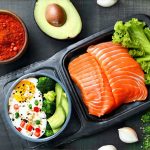Bloating during intense workouts is an incredibly common experience, yet often misunderstood. It’s not necessarily a sign you’re doing something wrong; rather, it reflects your body’s complex physiological response to stress and exertion. Many athletes, from recreational gym-goers to elite competitors, grapple with this discomfort, which can range from mildly annoying to significantly disruptive, impacting performance and overall enjoyment of physical activity. Understanding the ‘why’ behind workout bloating is the first step towards managing it effectively, and that’s what we’ll explore in detail here, offering practical strategies to minimize its impact and keep you feeling your best when pushing your limits.
The sensation of bloating isn’t simply about looking puffed up; it stems from various internal processes. Increased blood flow to the digestive system during exercise can sometimes slow down gut motility – the rate at which food moves through your digestive tract – leading to gas buildup and discomfort. Furthermore, intense physical activity can trigger hormonal fluctuations that affect fluid balance and digestion. The body’s natural stress response also plays a role; cortisol release can impact gut function and contribute to bloating in some individuals. It’s important to remember everyone experiences these effects differently, influenced by individual physiology, diet, hydration levels, and the type of workout being performed. If you find yourself struggling with digestive issues alongside this, consider exploring manage GERD during pregnancy as it may offer relevant insights into gut health.
Understanding the Root Causes
Bloating during workouts isn’t usually about what you did during the session, but more often about a confluence of factors surrounding it. One key contributor is digestive discomfort. When we exercise vigorously, blood flow gets redirected away from the digestive system and towards muscles that need oxygen. This can slow down digestion and lead to gas production as food sits undigested for longer periods. The type of food consumed before, during, and after a workout significantly impacts this process; certain foods are more prone to causing fermentation in the gut, resulting in bloating. Planning ahead with adjust your diet during travel can help prepare your digestive system for activity.
Another significant factor is fluid balance. Intense workouts cause us to sweat, leading to fluid loss. If we don’t adequately rehydrate, our bodies can retain water in other areas – including the digestive system – as a compensatory mechanism. This contributes to that uncomfortable feeling of fullness and swelling. Electrolyte imbalances, often stemming from dehydration or excessive sweating, can also play a role, impacting digestion and water regulation. Finally, hormonal responses to stress, particularly cortisol release during exercise, can affect gut motility and contribute to bloating in susceptible individuals. Individual responses vary, so understanding your body’s signals is key.
It’s important to differentiate between temporary workout-related bloating and chronic digestive issues. If bloating persists even when you’re not exercising, or is accompanied by other symptoms like severe pain, changes in bowel habits, or unintended weight loss, it’s essential to consult a healthcare professional to rule out underlying medical conditions. Managing indigestion during stressful times can also help mitigate some of the factors contributing to bloating.
Dietary Adjustments for Minimizing Bloat
Diet plays a monumental role in managing workout bloating. The pre-workout meal is particularly important—avoiding foods that are known gas producers or slow to digest can make a huge difference. Here’s how you can refine your dietary approach:
- Prioritize easily digestible carbohydrates: Opt for quick-digesting carbs like bananas, rice cakes, or oatmeal before exercise. These provide energy without putting excessive stress on the digestive system.
- Limit high-fiber foods immediately before workouts: While fiber is crucial for overall health, consuming large amounts right before a workout can lead to gas and bloating. Save higher-fiber meals for times when you’re not exercising intensely.
- Reduce fat intake pre-workout: Fats take longer to digest than carbohydrates or proteins, potentially slowing down the digestive process and contributing to discomfort.
- Be mindful of FODMAPs: Fermentable Oligosaccharides, Disaccharides, Monosaccharides, And Polyols (FODMAPs) are types of carbohydrates that can be poorly absorbed in the small intestine, leading to fermentation and gas production. Some individuals find reducing high-FODMAP foods (like onions, garlic, apples, and certain legumes) helpful for managing bloating.
- Hydrate strategically: Drink adequate water throughout the day, especially before, during, and after your workout. Consider electrolyte drinks if you sweat heavily to replenish lost minerals.
Hydration Strategies During Exercise
Proper hydration is often overlooked, but it’s a cornerstone of preventing workout-related bloating. Dehydration can exacerbate digestive issues and lead to fluid retention in the gut, intensifying that uncomfortable feeling. Here’s how to optimize your hydration strategy:
- Pre-hydrate: Start hydrating several hours before your workout. Aim for 16-20 ounces of water at least two to three hours beforehand.
- Sip consistently during exercise: Don’t wait until you feel thirsty to drink. Take small, frequent sips of water throughout your workout – about 4-8 ounces every 15-20 minutes is a good starting point.
- Replenish electrolytes: If your workout lasts longer than an hour or you sweat profusely, consider adding an electrolyte drink or supplement to replace lost minerals like sodium, potassium, and magnesium. These play crucial roles in fluid balance and digestion. Electrolyte imbalances can significantly contribute to bloating. Staying hydrated while managing GERD on the go is also important for overall gut health.
- Avoid sugary drinks: Sugary sports drinks can sometimes worsen bloating due to their high osmotic load—drawing water into the digestive system. Opt for lower-sugar options or electrolyte solutions.
Post-Workout Recovery & Digestive Support
The period after your workout is just as important as what you do before and during it, when it comes to minimizing bloating. Your body needs time to recover, and supporting digestion can help prevent discomfort. Here’s how:
- Focus on easily digestible protein: Consuming a small amount of lean protein post-workout aids in muscle recovery without overly stressing the digestive system. Whey protein isolate or Greek yogurt are good options.
- Continue hydrating: Replenish fluids lost during exercise by continuing to drink water throughout your recovery period.
- Consider probiotics: Probiotics can help restore a healthy balance of gut bacteria, promoting efficient digestion and reducing gas production. Talk to your doctor about whether a probiotic supplement might be beneficial for you.
- Gentle movement: Light activity like walking or stretching after intense exercise can help stimulate digestion and reduce bloating. Avoid immediately collapsing into a sedentary position.
- Listen to your body: Pay attention to how different foods impact you, and adjust your diet accordingly. What works for one person may not work for another – individual responses vary. It’s also helpful to understand how to keep reflux in check during recovery periods.
It’s important to remember that managing workout bloating is an iterative process. Experiment with different strategies, track what works best for you, and don’t hesitate to consult a registered dietitian or healthcare professional if you have persistent concerns. The goal isn’t necessarily to eliminate bloating entirely—it’s about minimizing its impact so you can enjoy your workouts without discomfort and maximize your performance. Learning how to stay grounded during food reactions can also help you navigate potential digestive sensitivities.


















